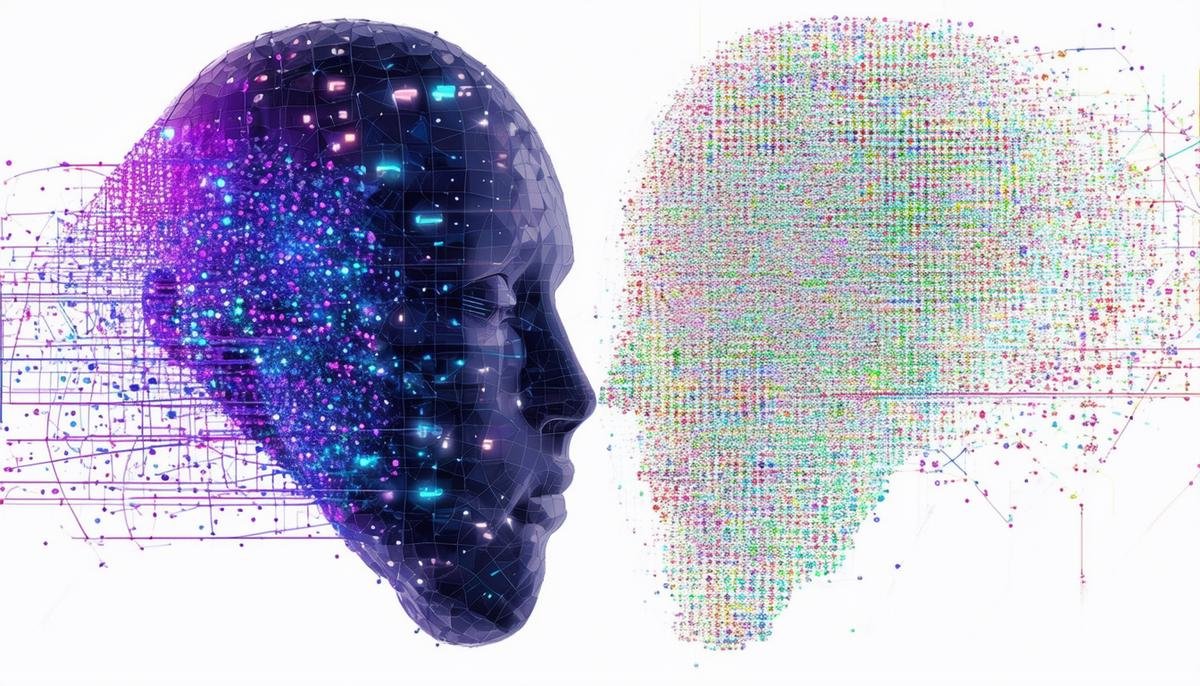Understanding AGI and Its Capabilities
Artificial General Intelligence (AGI) represents a significant advancement over current AI technologies. Unlike narrow AI, which excels at specific tasks, AGI aims to match or exceed human intelligence across various domains. AGI can learn, reason, and adapt, comparable to having a human-like cognitive ability in a machine.
AGI incorporates advanced machine learning techniques to understand and generate responses from vast amounts of information. It uses deep learning to build layers of knowledge and connections, allowing it to not just perform tasks but also understand context and apply a form of intelligence across different scenarios.
A key feature of AGI is its ability to learn and adapt without human intervention. It can continuously learn from interactions and experiences, potentially mastering new skills or complex theories independently.
Potential of AGI
- Revolutionize various aspects of life and work
- Manage tasks from scheduling to strategic decision-making in professional settings
- Offer personalized advice and manage household tasks at home
Compared to narrow AI, AGI offers a multi-faceted approach. While current AI might perform one or a few tasks well, AGI could handle a wide range of functions, understanding and responding to complex forms of communication and situations.
The development of AGI brings significant challenges, including ensuring these systems are safe, ethical, and unbiased. Integrating AGI into everyday life requires careful consideration of privacy, security, and the potential for over-reliance on technology.

Integration of AGI in Personal Assistants
AGI integration in personal assistants offers significant improvements in natural language processing, contextual understanding, and personalized assistance. Unlike current AI assistants limited to programmed responses, AGI can comprehend nuances, detect emotions, and engage in more natural conversations.
An AGI-enabled assistant could recognize sentiment and adapt responses based on the user’s tone and mood. For example, it might suggest rescheduling meetings or recommend relaxation techniques if it detects user fatigue.
AGI in Professional Settings
In professional settings, an AGI assistant could:
- Manage schedules more efficiently by understanding meeting priorities and stakeholder relationships
- Prepare executives for meetings by providing relevant information
- Draft preliminary email responses based on past correspondence
AGI’s learning capabilities ensure that personal assistants become more effective over time. They can adapt to user preferences and proactively arrange details without repeated inputs. For instance, in travel planning, an AGI assistant could learn and apply user preferences for airlines, seating, and dietary requirements.
“While AGI integration in personal assistants is promising, it’s important to address challenges such as privacy and data security. Continuous monitoring and ethical guidelines will be crucial to ensure these systems respect user privacy and autonomy.”
Practical Applications and Benefits
AGI-powered personal assistants offer practical applications that enhance daily life management and productivity. These assistants can provide customized morning briefings, including weather updates, traffic conditions, and prioritized schedules based on task importance and personal productivity patterns.
Key Applications of AGI Assistants
- Task Automation: Handling routine activities like email management, sorting important messages, and responding to basic queries
- Personalized Recommendations: Suggesting books, entertainment, or activities tailored to the user’s interests and mood
- Professional Support: Optimizing schedules, preparing briefing notes, and predicting project delays in fields like project management
- Healthcare Management: Monitoring health metrics, providing feedback, and suggesting lifestyle changes based on real-time data and medical history
The integration of AGI into personal assistants ultimately leads to time savings and increased efficiency. By handling repetitive tasks, these assistants free up time for activities that require human creativity and emotional intelligence, potentially improving work-life balance and overall productivity1.

Challenges and Ethical Considerations
AGI’s integration into personal assistants raises important challenges and ethical considerations. Privacy and data security are key concerns, given the vast amounts of personal information these systems will access. Implementing strong encryption, transparent data usage policies, and user controls are essential to protect sensitive data.
Algorithmic bias presents another challenge. AGI systems may perpetuate or amplify biases present in their training data. Mitigating this requires diverse datasets, active monitoring, and involving ethicists in the development process.
Overdependence on AGI is a valid concern. It’s crucial to design systems that augment human capabilities rather than replace them, encouraging user engagement and critical thinking.
Responsible AI development, adhering to ethical guidelines that prioritize user well-being, is vital. Regulatory frameworks play a crucial role in ensuring AGI systems are safe, ethical, and transparent. Collaboration between public and private sectors, academia, and civil society is necessary for effective implementation of these standards.
“The development of full artificial intelligence could spell the end of the human race.”1 – Stephen Hawking

Future Trends and Developments
The future of AGI and personal assistants promises significant advancements that will reshape various aspects of our lives. Key areas of progress include:
- Refined deep learning algorithms: Enabling AGI to better comprehend complex concepts.
- Unsupervised learning techniques: Allowing AI to learn and adapt more autonomously.
- Multimodal AI systems: Integrating various data sources for more comprehensive support.
- Advanced natural language processing: Facilitating more sophisticated and natural conversations.
These developments will enhance AGI assistants’ capabilities across industries such as healthcare, finance, and education. In the workplace, AGI assistants may take on complex tasks, freeing employees to focus on innovative activities.
Future AGI might also develop enhanced emotional intelligence, potentially benefiting fields like mental health care. A study by Deloitte predicts that AI could boost labor productivity by up to 40% by 2035.2
As AGI technology advances, it’s important to consider its broader societal impact, addressing challenges such as job displacement and data privacy through ongoing research and effective regulatory frameworks.

AGI-powered personal assistants offer practical benefits that can streamline daily tasks and enhance productivity. Moving forward, addressing challenges thoughtfully will be key to harnessing AGI’s potential effectively. As we embrace this technology, we must remain vigilant in ensuring it serves humanity’s best interests.




